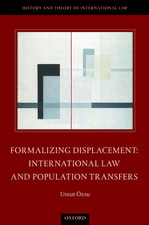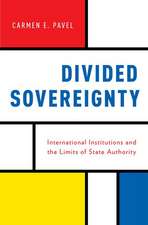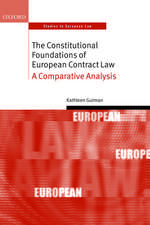Frontiers of Equality in the Development of EU and US Citizenship
Autor Jeremy B. Bierbachen Limba Engleză Hardback – 17 feb 2017
This book provides a framework for comparing EU citizenship and US citizenship as standards of equality. If we wish to understand the legal development of the citizenship of the European Union and its relationship to the nationalities of the member states, it is helpful to examine the history of United States citizenship and, in particular, to elaborate a theory of ‘duplex’ citizenships found in federal orders. In such a citizenship, each person’s citizenship is necessarily ‘layered’ with the citizenship or nationality of a (member) state. The question this book answers is: how does federal citizenship, as a claim to equality, affect the relationship between the (member) state and its national or citizen? Because the book places equality, not allegiance to a sovereign at the center of its analysis of citizenship, it manages to escape traditional analyses of the EU that measure it by the standard of a sovereign state. The text presents a coherent account of the development of EU citizenship and EU civil rights for those who wish to understand their continuing development in the case law of the Court of Justice of the European Union.
Scholars and legal practitioners of EU law will find novel insights in this book into how EU citizenship works, in order to be able to grasp the direction in which it will continue to develop. And it may be of great interest to American scholars of law and political science who wish to understand one aspect of how the EU works as a constitutional order, not merely as an order of international law, by comparison to their own history.
Jeremy Bierbach is an attorney at Franssen Advocaten in Amsterdam. He holds a Ph.D. in European constitutional law from the University of Amsterdam, the Netherlands.
Preț: 905.36 lei
Preț vechi: 1104.11 lei
-18% Nou
Puncte Express: 1358
Preț estimativ în valută:
173.26€ • 178.75$ • 146.64£
173.26€ • 178.75$ • 146.64£
Carte tipărită la comandă
Livrare economică 05-19 martie
Preluare comenzi: 021 569.72.76
Specificații
ISBN-13: 9789462651647
ISBN-10: 9462651647
Pagini: 560
Ilustrații: XI, 474 p.
Dimensiuni: 155 x 235 x 27 mm
Greutate: 0.86 kg
Ediția:1st ed. 2017
Editura: T.M.C. Asser Press
Colecția T.M.C. Asser Press
Locul publicării:The Hague, Germany
ISBN-10: 9462651647
Pagini: 560
Ilustrații: XI, 474 p.
Dimensiuni: 155 x 235 x 27 mm
Greutate: 0.86 kg
Ediția:1st ed. 2017
Editura: T.M.C. Asser Press
Colecția T.M.C. Asser Press
Locul publicării:The Hague, Germany
Cuprins
Civis duplex sum: two layers of citizenship in a dialogue of equality.- Subjecthood in England and the British Empire.- From Revolution to Constitution to Civil War: US citizenship in its youth.- Horizontal conflict in United States citizenship before the Civil War.- A new, vertical beginning for United States citizenship.- European integration as a project of the member states.- The de facto Community citizen emerges.- The Maastricht Treaty introduces European Union citizenship de jure.- The Union legislature elaborates on Union citizenship; the Court responds.- O & B and S & G: the Court clarifies the relationship of freedom of movement to Union citizenship.- Conclusions.- Sources.
Textul de pe ultima copertă
This book provides a framework for comparing EU citizenship and US citizenship as standards of equality. If we wish to understand the legal development of the citizenship of the European Union and its relationship to the nationalities of the member states, it is helpful to examine the history of United States citizenship and, in particular, to elaborate a theory of ‘duplex’ citizenships found in federal orders. In such a citizenship, each person’s citizenship is necessarily ‘layered’ with the citizenship or nationality of a (member) state. The question this book answers is: how does federal citizenship, as a claim to equality, affect the relationship between the (member) state and its national or citizen? Because the book places equality, not allegiance to a sovereign at the center of its analysis of citizenship, it manages to escape traditional analyses of the EU that measure it by the standard of a sovereign state. The text presents a coherent account of the development of EU citizenship and EU civil rights for those who wish to understand their continuing development in the case law of the Court of Justice of the European Union.
Scholars and legal practitioners of EU law will find novel insights in this book into how EU citizenship works, in order to be able to grasp the direction in which it will continue to develop. And it may be of great interest to American scholars of law and political science who wish to understand one aspect of how the EU works as a constitutional order, not merely as an order of international law, by comparison to their own history.
Jeremy Bierbach is an attorney at Franssen Advocaten in Amsterdam. He holds a Ph.D. in European constitutional law from the University of Amsterdam, the Netherlands.
Caracteristici
Provides a framework for comparing US citizenship and EU citizenship as standards of equality Explains in detail the legal implications of allegiance to a sovereign in order to show why allegiance is not the most important aspect of citizenship Develops its analysis chronologically, over more than 400 years, but allows the reader to open the book at any point, providing references ‘supra’ to previously reached conclusions Includes supplementary material: sn.pub/extras




















